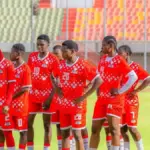Benin coach calls on FIFA to rule on South Africa’s use of ineligible player in World Cup qualifier

Benin head coach Gernot Rohr has urged FIFA to take swift action over South Africa’s alleged fielding of an ineligible player during a 2026 World Cup qualifying match, warning that the integrity of Group C could be compromised if the matter is left unresolved before the final fixtures.
The dispute centres on Teboho Mokoena’s participation in South Africa’s 2-0 victory over Lesotho in March 2025. Rohr claims the midfielder should have been serving a one-match suspension after accumulating two yellow cards earlier in the campaign.
His appearance, the Benin coach insists, constitutes a clear breach of FIFA’s competition regulations.
Mokoena’s bookings came in separate matches: the first against Benin on 18 November 2023, and the second against Zimbabwe on 11 June 2024. Under Chapter 9, paragraph 4 of the World Cup regulations, a player who receives two cautions in different matches must miss the following fixture. In this case, that would have been the Group C encounter against Lesotho. Despite the suspension rule, Mokoena was named in the starting line-up.
Rohr argues that the violation is straightforward and requires no lengthy deliberation. “South Africa used an ineligible player in a World Cup qualifying match, which means they must lose three points and the result should be recorded as a 3-0 win for Lesotho,” he said, referencing FIFA’s standard sanction for such cases. “This needs to be addressed now, not later.”
The German coach, who has managed several African national teams, framed his appeal as a matter of fairness for all competing nations. “With the final qualifying matches approaching, it is imperative, in the interest of fair play, that every team knows its legitimate position in the standings before September,” Rohr told Nigerian journalist Osasu Obayiuwana.
The consequences of a points deduction could reshape the group. South Africa currently lead with 13 points, five ahead of both Benin and Rwanda on eight.
Removing three points from the leaders would narrow the gap to just two, setting up a highly competitive run-in. Lesotho, meanwhile, would climb from six to nine points if awarded the victory, keeping their own qualification hopes alive.
The issue has reignited debate within Group C over the enforcement of disciplinary rules in international competition. Rohr’s comments have placed public pressure on FIFA to act before the next round of fixtures, scheduled for September 2025, to avoid disputes overshadowing the closing stages of the qualifiers.
While FIFA has yet to issue a formal statement on the matter, the governing body’s regulations appear clear on suspensions for accumulated cautions. Any official ruling will be closely watched, not only by the teams directly involved but by others in the African qualifiers who see strict application of the rules as essential to maintaining competitive integrity.
For Rohr, the case is about more than a single result — it is about ensuring that the pathway to the World Cup remains transparent and decided on the pitch, without the shadow of unresolved disputes lingering over the competition.




